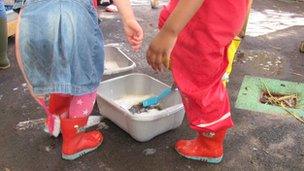Free nursery scheme '55,000 places short'
- Published

Hundreds of thousands of three- and four-year-olds already use free nursery places
A flagship government scheme to offer free nursery places to disadvantaged two-year-olds could be hit by shortages and delays, it is feared.
Nursery providers and local councils say some areas may not be ready for the national roll-out to 130,000 toddlers across England in September this year.
Some 75,000 places have been found. The government is working with councils and providers to find the remaining 55,000.
South-east England, Birmingham and Manchester are struggling the most.
The scheme to provide 20% of disadvantaged two-year-olds with free part-time early education places was announced by Deputy Prime Minister Nick Clegg in the autumn of 2010 as part of a package of measures to boost the educational achievement of children from poorer homes.
It was an extension of a Labour scheme, and is due to be expanded again to 260,000 children in September next year.
But only 75,000 places have been secured just four months before the September roll-out, of which 70,000 are on existing pilot schemes.
'Geographical mismatch'
James Hempsall, who is overseeing the delivery of the Achieving Two-Year-Olds programme, shrugged off concerns, saying local authorities, who now have a duty to ensure sufficient places, were reporting a "high level of confidence for delivery in September 2013".
He said work was focusing on vacant places and creating more flexibility, such as asking nurseries to provide a third session on top of the traditional morning and afternoon sessions.
But Dr Jill Rutter, research manager at the Family and Childcare Trust, said it was a real struggle in poorer areas where the places are needed but where there tends to be less nursery provision.
"Local authorities are doing their best but there will be gaps in September 2013 and very possibly in 2014."
She added: "There is a geographical mismatch and so new places have to be created from scratch."
This was backed up by the chairman of the Local Government Association, David Simmonds, who acknowledged a mixed picture nationally.
He said areas of south-east England, Birmingham, Manchester and Bradford were struggling, despite their best efforts to make enough places available in the right areas.
'Bureaucratic shuffle'
Mr Simmonds said: "We are determined to get there but at the moment there is some uncertainty, and some providers are saying we are not sure we can recruit the staff, we are not sure we can get the buildings we need built in time. Uncertainty is not what mums and dads want. They need to know where their children will be going."
He said the process was being complicated because money for the scheme was being fed through a grant made specifically for schools, which was causing a "bureaucratic shuffle".
The Department for Education is expecting to pass to councils early this month a list of names and addresses of which children have been earmarked for the places.
But Mr Simmonds said: "It doesn't leave much time if there is going to be a big discrepancy between need and availability."
Neil Leitch, chief executive of the Pre-School Learning Alliance, which represents 14,000 nurseries, said: "I don't know how they are going to deliver the remaining balance in such a short period. Nurseries will have to train staff and they will have to increase the size of their buildings."
Cross-subsidy fears
Dr Rutter highlighted the problems faced by London, which she had recently researched. She said space was limited, with many nurseries already operating at full capacity, but that an extra 24,100 places were needed by September next year.
She added: "Traditionally with the three and four-year-old places, private providers have been able to finance it by relying on working parents buying extra hours for their children at a higher cost than the subsidised rate.
"But this group of children is the 20% of the poorest and this isn't going to happen because their parents are not working. So the cross-subsidy system won't work.
"As a result, a lot of the private and voluntary providers are refusing to offer places for two-year-olds."
Nurseries are being offered at £5.08 an hour per child by the Department for Education (DfE) through the direct schools grant.
'Plenty of time'
Mr Hempsall said the vast majority of children would make use of places made from capacity released within the sector, but he acknowledged that it was a "challenge" to deliver the programme and that there was "a lot more work to be done".
Once local authorities had the details of which children were to benefit from the free places, he said, they would be able to map their supply to where the disadvantaged children lived.
But he stressed that there was "plenty of time" for nurseries to carry out any of the simple building adaptations likely to be required.
And he said that transport arrangements might have to be put in place for children who could have to travel across local authority boundaries to take up their place.
A spokesman for the DfE said: "Through the Achieving Two-Year-Olds programme we are giving councils and providers support to make sure they have enough capacity for early learning for two-year-olds, encouraging parental demand, and improving the quality of provision.
"Already some 70,000 children are benefiting from this investment in early learning for two-year-olds."
Shadow Children and Families Minister Sharon Hodgson said: "The childcare crisis created by David Cameron just gets worse.
"Parents who were promised free childcare will be shocked to learn that ministers have failed to ensure enough nursery places are available."
- Published15 October 2010
- Published30 May 2012
- Published11 November 2011